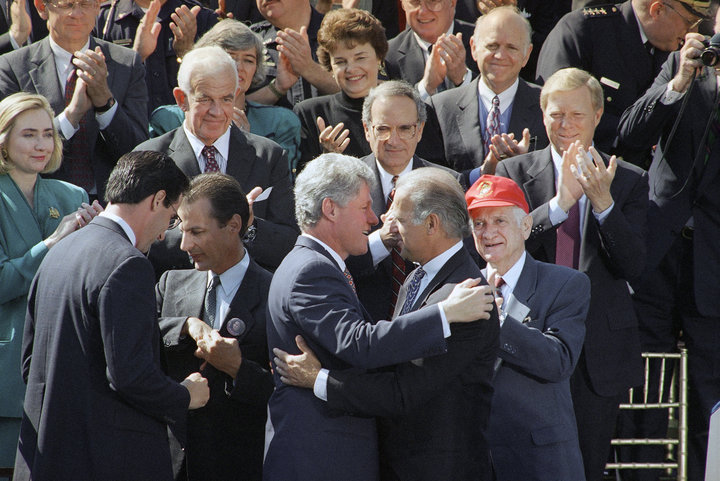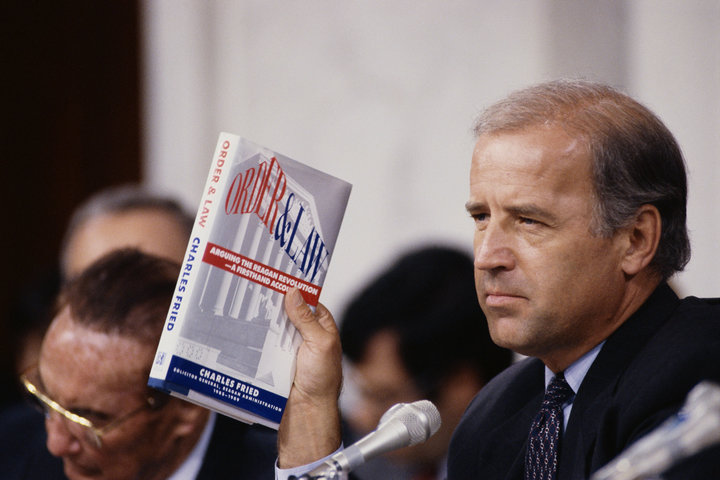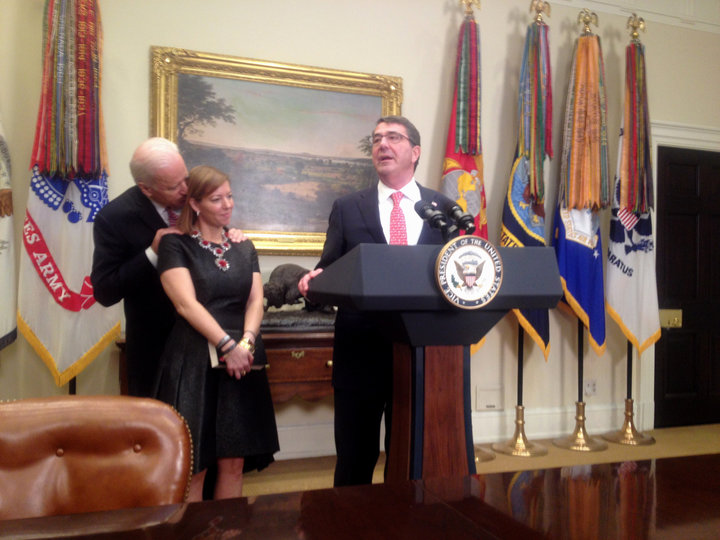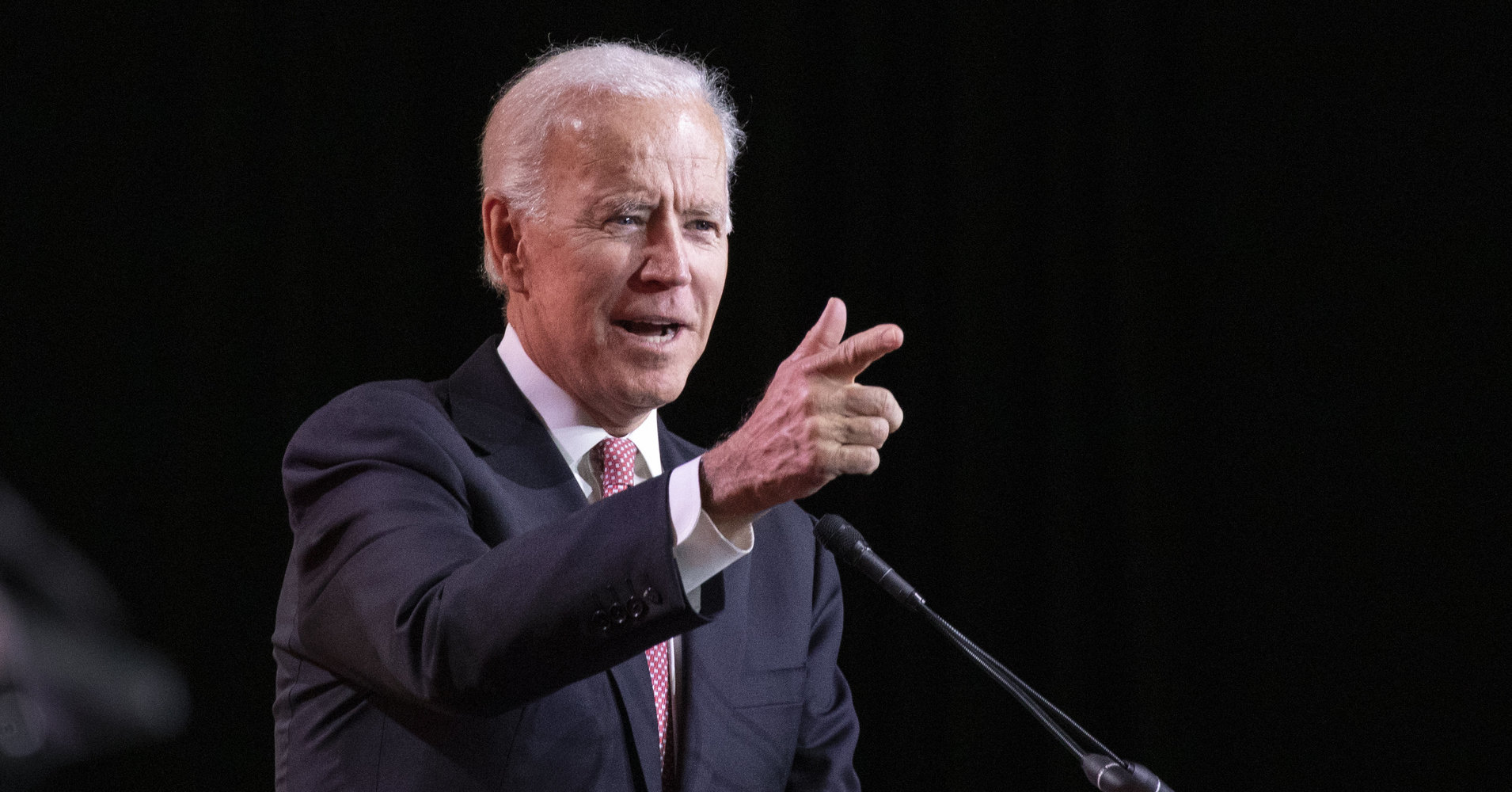[ad_1]
Former Vice President Joe Biden is “very close” close to making a decision about joining the 2020 presidential race, he said at the University of Delaware earlier this month.
Biden has said that his 40 years in the U.S. Senate make him the “most qualified” candidate for the presidency. But if he does indeed choose to launch a campaign, that four-decade record may actually do him more harm than good — especially in the eyes of an increasingly diverse and progressive Democratic primary electorate. (Biden’s spokespeople did not reply to HuffPost’s request for comment.)
Here are seven issues that may keep progressives and Democrats from giving Biden their vote.
Criminal Justice
In 1994, Biden didn’t just support then-President Bill Clinton’s Violent Crime Control Act ― he was the main Senate author of it and encouraged Clinton to “seize control of the issue by upping the ante” on punishment for crimes.
The $30-billion Violent Crime Control Act resulted in the construction of more prisons, put more police on the streets of black neighborhoods, increased arrests and prison sentences for drug users and also increased the presence of Border Patrol. During the 2016 presidential election, Democratic nominee Hillary Clinton acknowledged that the legislation was a “mistake” a year after her husband apologized for it.

But the 1994 bill was nothing out of the ordinary for Biden to support. Well before Bill Clinton took office, Biden’s views and votes regarding the criminal justice system were much more aligned with conservatives than liberals.
In 1986 and 1988, he supported the Anti-Drug Abuse Act, which sought to increase mandatory minimum sentences for drug arrests. In 1991, he supported legislation that would increase the number of crimes that could warrant the death penalty.
Biden was proud to gain notoriety for supporting the death penalty. In a 1991 speech on the Senate floor (embedded below), he boasted about a proposed crime bill that would introduce dozens of new death penalty offenses: “A wag in the newspaper recently wrote that, something to the effect, that Biden has made it a death penalty offense for everything but jaywalking.”
Biden liked the saying so much he repurposed it over the next several years of drafting the bill, which Clinton signed into law in 1994.
Biden reportedly wanted to make the Democratic Party the toughest on crime.
Earlier this year, in a celebration of Martin Luther King Jr., he did acknowledge that he hasn’t “always been right” on the topic of criminal justice and that “white America has to admit there’s still a systematic racism, and it goes almost unnoticed by so many of us.”
But for those who have watched Biden’s political career benefit from the punitive policies he enacted in the 1990s, it may be too little too late.
“I would like to be running and have someone ‘use the crime bill’ against me,” he bragged in 1994.
If he runs in 2020, someone might.
Biden has made it a death penalty offense for everything but jaywalking.
Abortion
In his 40 years in the Senate, Biden supported a range of anti-abortion legislation.
He has long advocated against dilation and extraction abortion procedures and supports the Hyde Amendment, a ban on federal funding for abortion. In the 1980s, he supported President Ronald Reagan’s Global Gag Rule against providing aid to NGOs that offer or inform patients about abortion care.
In the earliest days of his political career, Biden said he thought that Roe v. Wade went “too far” and said he didn’t think “a woman has the sole right to say what should happen to her body.”
Desegregation
One of Biden’s first major policy battles involved school busing ― a desegregation proposal to send buses to both white and black neighborhoods so kids of different races went to the same schools. Biden vehemently opposed it.
Arguably, busing was not the best way to desegregate schools. But in the early 1970s, to pretend that it wasn’t going to combat segregation was to pretend that segregation could be easily or effortlessly resolved. In 1974, Biden reportedly “morphed into a leading anti-busing crusader” when he learned that white people in his home state of Delaware were against it.
Busing ― and to an extent, desegregation ― “implied that blacks have no reason to be proud of their inheritance and their own culture,” Biden said in 1975. He voted a year later to bar federal funding for busing and also voted to bar the Health, Education and Welfare Department (now the Department of Health and Human Services) from providing any funds for busing.
In 1978, Biden proposed legislation that barred federal judges from ordering busing unless they could actually prove discrimination was occurring. It was “the most far-reaching anti-busing measure to receive serious consideration in the Senate,” fellow lawmakers said at the time. It was also unconstitutional.
The anti-busing crusade “enabled Biden to choose votes over principles, while acting as if he was not doing so,” historian Jason Sokol wrote in 2015.
Support For The War In Iraq
In 2002, Biden voted to support the invasion of Iraq and spoke out in support of President George W. Bush.
“President Bush did not lash out precipitously at Iraq after 9/11. He did not snub the U.N. or our allies. He did not dismiss new inspection regimes. He did not ignore Congress,” Biden said in a speech that same year.
In 2005, however, he told NBC that that had been a “mistake.”
“It was a mistake to assume the president would use the authority we gave him properly,” Biden said. “We gave the president the authority to unite the world to isolate Saddam. And the fact of the matter is, we went too soon. We went without sufficient force, and we went without a plan.”
Many of the other 2020 Democratic candidates were elected to the Senate years after the invasion of Iraq. The only other candidate in office with Biden at the time ― Sen. Bernie Sanders (I-Vt.), then a representative ― did not support the invasion.
We went too soon. We went without sufficient force, and we went without a plan.
Sen. Joe Biden (D-Delaware) in 2005, about the invasion of Iraq
If Biden runs, he’ll be the only candidate forced to confront his support of Bush and the Iraq invasion.
Support For The Banking Industry
In a race with Sanders and Sen. Elizabeth Warren (D-Mass.), Biden’s ties with the banking industry are likely to be a problem.
During his tenure as a senator for Delaware ― where many financial corporations are based that went on to donate to Biden’s campaigns ― Biden consistently voted in favor of credit card companies rather than consumers.
The vote that may haunt Biden the most in a race with more progressive candidates, though, was his support for the Bush-era Bankruptcy Abuse Prevention and Consumer Protection Act in 2001, which essentially gutted protections for families who declared bankruptcy.
“The Senate was evenly split between the two parties, but one of the bill’s lead sponsors was Democratic powerhouse Joe Biden, and right behind him were plenty of other Democrats offering to help,” Warren wrote in her 2014 autobiography.
“Never mind that the country was sunk in an ugly recession and millions of families were struggling — the banking industry pressed forward and Congress obliged.”
Mishandling Anita Hill’s Testimony
In 1991, as chairman of the Senate Judiciary Committee, Biden infamously mishandled Anita Hill’s sexual harassment allegations against current Supreme Court Justice Clarence Thomas. Biden has since apologized for how he handled the hearing.

“My one regret is that I wasn’t able to tone down the attacks on her by some of my Republican friends,” he said in an interview for Teen Vogue in 2017.
“I mean, they really went after her. As much as I tried to intervene, I did not have the power to gavel them out of order. I tried to be like a judge and only allow a question that would be relevant to ask.”
Earlier this month, Biden apologized again ― though many felt it was more of a nonapology.
“We knew a lot less about the extent of harassment back then, over 30 years ago,” he said at a Biden Foundation event in New York City.
“But she paid a terrible price, she was abused for the hearing. She was taken advantage of. Her reputation was attacked. I wish I could have done something.”
He’s A Little Bit Creepy
While it’s not an official policy point, in a post-Weinstein America, Joe Biden might not be who the Democratic Party needs to face off with Trump in 2020.
Biden has a not-insignificant history of behavior toward women that he likely intended to be charming, but that they or others perceived as condescending or that made them uncomfortable.

“A big part of his act was remarking on the attractiveness of women, young and old,” HuffPost’s Amanda Terkel wrote in 2017. “He would comment on how pretty young women were and warn their fathers to keep the guys away.”
On more than one occasion, Biden made women visibly uncomfortable with kisses and shoulder rubs, to say nothing of his history of whispering in women’s ears.
On March 29, Lucy Flores, a former member of the Nevada State Assembly, published an essay in the Cut describing in detail a 2014 campaign event in Las Vegas where Biden rubbed her shoulders, smelled her hair and “proceeded to plant a big slow kiss on the back of [her] head.”
“I couldn’t move and I couldn’t say anything,” Flores wrote. “I wanted nothing more than to get Biden away from me.”
After years of Trump ― for whom women’s accusations of sexual assault and misconduct continue to fly under the radar ― Democratic women may not want another man accused of inappropriate conduct running the country.
“Hearing Biden’s potential candidacy for president discussed without much talk about his troubling past as it relates to women became too much to keep bottled up any longer, ” Flores said.
[ad_2]
Source link

